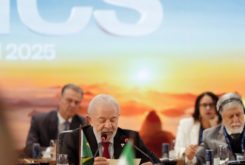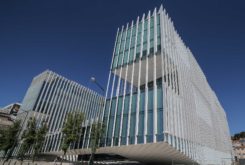A little over a year ago, Brazil guaranteed that it would play a bigger role in Forum Macao’s activities in the future. The government of Michel Temer named a representative to the Forum from the Consulate General in Hong Kong. But the change of administration in Brasília, now under President Jair Bolsonaro, has brought that effort to a near standstill.
Brazil is the biggest trade partner of China out of the eight Portuguese-speaking countries, and China the main importer of Brazilian products. Forum Macao had, thus, long been pushing for Brazil to play a more active role, even before the 2018 changes.
In March 2018, coinciding with the 15th anniversary of the creation of the Forum Macao, then Brazilian Ambassador to China Marcos Caramuru de Paiva decided, after consultations with the Ministry of Foreign Affairs, that the follow-up of the Forum’s affairs would be done by Rafael Rodrigues Paulino, career diplomat of the Brazilian Consulate General in Hong Kong, elevating the country’s representation.
Paiva was particularly attracted by the possibility of participating in major trade fairs in various provinces of mainland China, that could generate business for Brazilian companies.
But, according to our sources, the Brazilian Consulate General in Hong Kong is generally overwhelmed and, to increase its activity in Forum Macao, requires Brasília to name more diplomats. It was said that the consulate will be reinforced with two more diplomats, but the new administration – and a new minister of Foreign Affairs, Ernesto Araújo – has brought the process to a standstill. Once the team is strengthened, the vice-consul is expected to have more time available to dedicate to the Forum.
At the recent Meeting of Entrepreneurs for Economic Cooperation between China and the Portuguese-speaking Countries, in São Tomé, 8–9 July, the absence of Brazil was particularly noted. Not only was the country’s representative to the Forum absent, but Brazilian businessmen were also absent.
Brazilian Foreign Affairs Minister Ernesto Araújo hosted a BRICS foreign ministers meeting last week. With the new president, Jair Bolsonaro, prioritising forging a closer relationship with the US, Araújo assured the effort “will in no way disrupt the relationship with China.” He recalled that Brazil has delayed the investment in the two sectors in which the Chinese are now interested, energy and infrastructure.
In addition to the Macao ministerial summits, which have attracted high-level attendance from both mainland China and the Portuguese-speaking countries, the activities of the Forum have involved the participation of Portuguese-speaking countries in fairs and events in mainland China’s provinces. According to sources, the level of Lusophone representatives has so far not been sufficient to take advantage of the contacts and the links that are provided to them.
The Forum permanent secretariat was reinforced in 2017 with the arrival of a new Portuguese-speaking representative, Rodrigo Brum, Portuguese national and native of Mozambique, who previously served in the former Portuguese administration of Macao in the 1990s, and later held government level posts in Lisbon. Brum was appointed as deputy secretary-general in representation of the eight Portuguese-speaking countries. He succeeded Mozambican diplomat Vicente de Jesus Manuel (2013–2017) and will end his term in 2020, with the naming of a new representative, this time by São Tomé and Príncipe.
In the background, calls have been growing for an increase in financial support instruments, specifically to small and medium-sized businesses because the present Cooperation and Development Fund is a venture capital instrument, with return on invested capital and a pre-established rate of return and most projects surfacing at the level of Forum Macao are small-scale and high risk.
CLBrief knows that both Macao and Portugal have shown availability to finance a different fund to support small and medium-sized businesses, and discussions took place with the previous Brazilian ambassador in China. At that time, the diplomat endorsed the idea that the Fund should remain a business-intended mechanism and not merely a platform for official development assistance.
Portuguese participation in the Forum is generally assessed as reduced, despite frequent declarations from Portugal in support of the Forum Macao; Portugal did host the Entrepreneurs Meeting in June 2018. Maria João Bonifácio, former representative of AICEP Portugal Global as well as Economic and Commercial representative at the Consulate General of Portugal in Macao, was recently named Portuguese permanent delegate to the Forum, but changes to Portugal’s subdued attitude are generally not expected.
At the Entrepreneurs Meeting in Sao Tomé, the highest-ranking member of the Portuguese delegation was an advisor to the board of AICEP, Luís Rebelo de Sousa. No member of the AICEP board travelled to São Tomé.
In contacts in Macao during a visit in 2018, the new Portuguese ambassador to Beijing, José Augusto Duarte, was open to a more interventionist participation of Portugal in the Forum but conditioned it on the presentation of favourable results to Portugal at commercial and investment level, which he evaluated as virtually non-existent.
For now, the smaller countries are the ones that most profit from their participation in the Forum Macao. The delegates of Cape Verde and Timor-Leste have been notable in that regard. Guinea-Bissau’s delegate, Malam Camará, successfully lobbied in São Tomé for the next Entrepreneurs Meeting to be held in Bissau.
As to São Tomé, a new delegate has just been named – Gika Makeba da Graça Simão – who replaced Gualter Sousa Pontes da Vera Cruz. The change was dictated by the change of government, at the end of 2018, in São Tomé, the most junior member of Forum Macao having joined in 2017. Vera Cruz has now gone to the private sector, working as an aide to a group from Macao.




